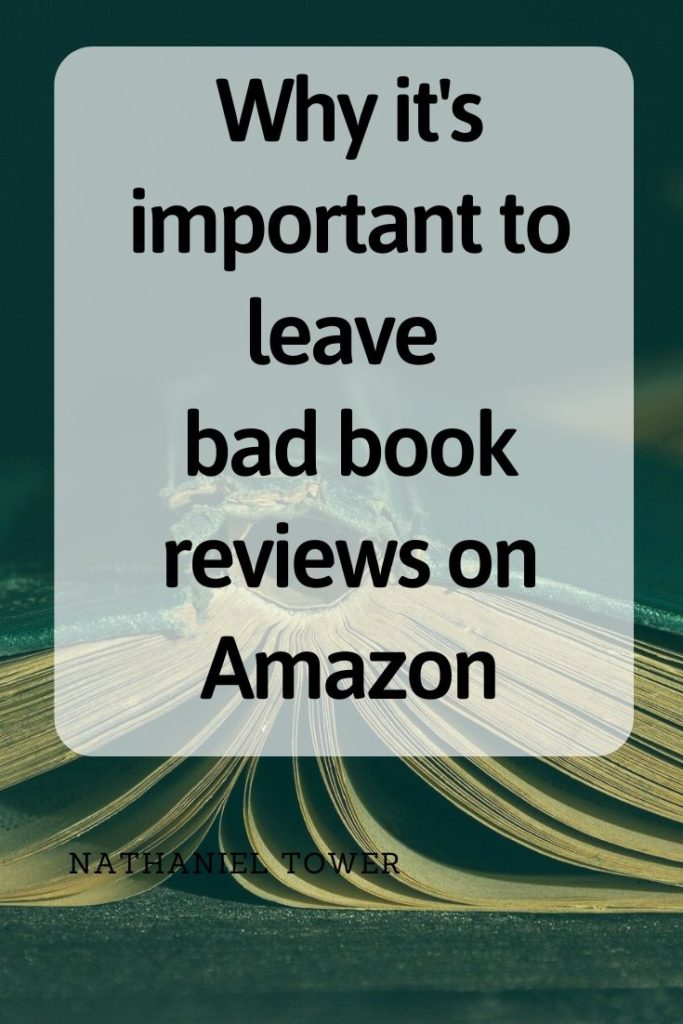Last Updated on December 31, 2019 by Nathaniel Tower
In the past, I only published good book reviews. If I really liked a book, I gave it 5 stars. If I kind of liked it, 4 stars. If I didn’t like it, then I didn’t post a review.
Okay, I have left a few bad reviews. Just not for small presses. I’ve never minded leaving bad reviews for Nickelback, James Franco, or Adam Sandler movies. But I never touched the small presses.
Why not? Well, my tentativeness centered around two main principles:
1. I felt bad. A lot of these small press books only have a half-dozen reviews or fewer. A 1-star review could really hurt.
2. I feared retaliation. If I leave a bad review of someone’s book, maybe he or she will send an army of friends to give my book a 1-star review.
However, I recently had a revelation: small presses need bad reviews too.
Why bad book reviews can help
When you think about it, how important is a 5-star rating for a book? How often do you browse books by highest rating and make your decision to purchase based on the ratio of good to bad reviews? For electronics, yes. But not for books.
That’s not the reason I started leaving negative reviews for books I don’t like. Here’s why I started:
Bad reviews (and all honest reviews) help the publisher. If everyone gives 5-star reviews just because they think they should, then the publisher assumes the book is a home run. “Hey, it looks like everyone loved this minimalist teenage vampire post-apocalyptic romance slasher book written in sentence fragments from the point of view of a four-year old. Let’s find more books just like it!”
Clearly no one benefits from the mass hysteria of 5-star reviews. Not the author, not the publisher, and definitely not the reader.
When it comes to small presses, reviews are the voice of the fans. They are sometimes even more meaningful votes than book sales. Sales tell a publisher that a lot of people bought the book, which could be a result of successful marketing, a load of hype, or an author with a long list of friends. In the world of small presses where books are lucky to sell by the dozens, sales don’t necessarily say, “Hey, this is a great book. Publish more like this.”
Bad reviews add legitimacy
One more thing about bad reviews: they add authority to a book. Nothing on this planet is universally loved. Books with only 5-star reviews say one of three things:
1. Only this author’s friends bought and reviewed this book.
2. People are afraid to leave bad reviews of this book.
3. People don’t care enough about this book to leave bad reviews.
Before you get all judgmental and accuse me of jealousy, hypocrisy, heresy, or something else, as of writing this, my short story collection has all 5-star reviews on Amazon. It’s 11 for 11. Is it a perfect book? No. Just not enough people are reading it. If more people bought it, the rating would inevitably go down.
Does that mean I want some 1- and 2-star reviews? Well, I’d prefer not to have them, but I do want as many honest reviews as possible. I’m not saying the reviews up now aren’t honest, but where are the rest of them? You won’t hurt my feelings if you rate my book with fewer than 5 stars. I can handle it, I promise.
I know the writing community is small and close-knit, but we can’t be afraid to say what we think. No one will become a better writer with this approach.
Of course, that doesn’t mean we need to be malicious with our reviews. That’s a completely different topic for another day.
What do you think? Do you ever leave bad reviews? Or do you think bad reviews are a writer’s nemesis? Share your thoughts in the comments section.
Author’s note: I never actually leave 1-star reviews. If a book is good enough for me to finish, then it deserves at least 2 stars. If I can’t finish it, then I don’t believe I have the right to review it.


I have “bad reviews” and I cherish them. They’ve helped me grow, why would I hate that? Isn’t the whole idea to master a craft. Most are only going to do that through their “failures”.